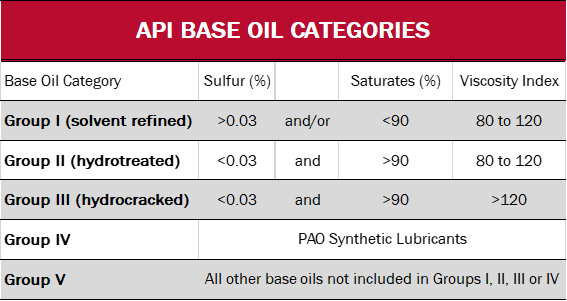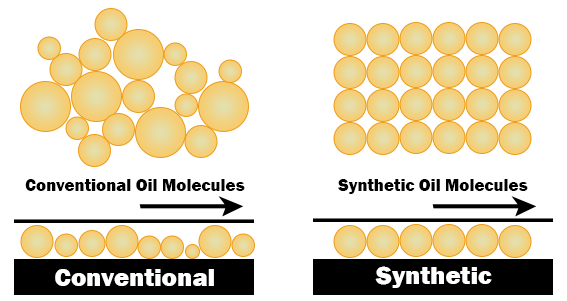OVERVIEW
When deciding between conventional and synthetic oils, one of the first things the consumer sees is the price tag that is tied to a synthetic oil. But it’s not always clear what we are getting for benefits from making the switch from a conventional to a synthetic product, which can make it difficult to justify that cost.
THE BENEFITS
So what exactly are the benefits that we get from using synthetic oils?
Synthetic oil undergoes a more advanced refining process than conventional oil which removes more of the impurities from the crude oil such as sulfur and unstable (unsaturated) hydrocarbons. The chart below shows the American Petroleum Institute’s (API) base oil classifications, with Group I and Group II base oil’s being the conventional products. This improved refining process removes impurities creating a more stable, more robust base oil.

Figure 1: API Base Oil Classifications
Using full synthetic oil in your equipment can offer the following direct benefits to your equipment:
- Extended component parts life
- Extended lubricant drains
- Elimination of seasonal oil changes – One oil all year round
- Reduced overall operating temperatures
Those direct benefits often lead to the indirect benefits which is where your true cost savings start:
- Less downtime (Scheduled & Unscheduled)
- Fewer replacement parts
- Reduced lubricant inventory and associated procurement, handing, disposal costs

Figure 2: Synthetic oils are uniform in size, which improves the load sharing capability and service life of the oil.
CONCLUSION
Now this isn’t to say that the answer is to use full synthetic oil in everything, you want to make sure that the application and environment makes sense for it. For example in a system that has sumps or equipment housings with more than minimal leakage it doesn’t matter how good the oil is if you are continually topping up the reservoir. Or in applications prone to contamination from dirt or water you may be changing out your oil more frequently and not getting the benefits from being able to do extended drains with a synthetic product.
So in summary, while synthetic oils provide benefits that more than justify the increased cost of the product itself, you need to ensure that they are the correct choice for the job you are doing as well.
